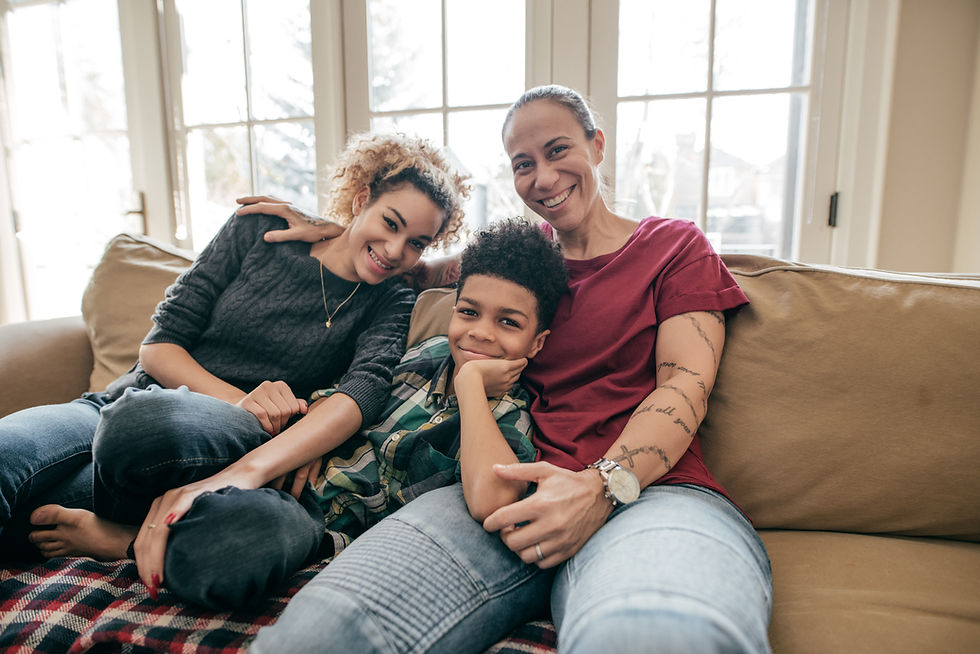Promoting CHARACTER STRENGTHS: Safe, Supportive Homes & Communities
- Kevin M. Powell, Ph.D.

- Feb 26, 2021
- 6 min read
Updated: Mar 20, 2023

There are many benefits to living in homes and communities where we feel safe and supported. And the content of our character is an important component for creating and maintaining such a place. Our ‘character’ is comprised of our values, attitudes, and behaviors that guide how we interact with others. These 'character strengths' help us to act in ways that are prosocial (actions that benefit others).
Character strengths have been linked to many positive outcomes, including better interpersonal skills, more social connections, better physical health, better psychological functioning, academic/educational achievements, occupational/career advancements, and more resilient responses to life stressors. Our personal relationships, homes, schools, and work settings are all safer and more positive when guided by character strengths.
Let’s take a look at a few of these influential character strengths, which we can teach our children and model in our everyday lives.
Kindness
Being compassionate, respectful, and helpful towards others is a valuable character quality. Kindness can also be directed towards our self (i.e., good self-care, including sleep, exercise, nutrition, leisure activities) and our natural environment (i.e., reusing, recycling, and utilizing alternative energy). All forms of kindness lead to good outcomes when practiced within our homes and within our community interactions with unique and diverse people.
Self-Regulation
We all experience a wide range of emotions, including happiness, sadness, anger, and fear. All these emotions are normal and adaptive when we regulate well enough to avoid extreme, maladaptive responses. Teaching our children self-control strategies can help them lead fulfilling lives and avert many negative outcomes. These strategies include deep breathing exercises, self-timeouts, positive self-talk, thought substitution, help-seeking behaviors (asking others for support), and learning how to respond assertively, as opposed to aggressively or passively. Good self-regulation is an essential character strength.

Honesty
Being truthful is another character strength to teach and model for our children. Nobody is perfect and we all make mistakes. It is a genuine strength when children and adults are honest, take responsibility, and learn from their mistakes. ‘Honesty’ is an attribute that seems to be deteriorating in recent years among some of our public leaders and social media outlets. We as community members must be informed consumers regarding the information we take in and always consider the content and source of the material. We must ask important questions (i.e., What do you mean? and How do you know?) to ensure we are receiving accurate information. If we want safe, prosocial communities; credible, fact-based journalism is vital. And raising children who value honesty and are critical thinkers is essential.
Humility
Being humble is another valuable character strength; that is, the ability to take pride in who you are and what you do, but without acting arrogant or superior to others. Humility is an especially important attribute for our community leaders. Humble leaders are open to considering others’ ideas and perspectives. They use their influence to empower and better the lives of others, rather than to benefit themselves.
When we practice and model 'character strengths' in our roles as, parents, teachers, human service providers, supervisors, government officials, news media executives, journalists, and social media users, we all reap the benefits.
References
Allgaier, K., Zettler, I., Wagner, W., Püttmann, S., & Trautwein, U. (2015). Honesty-humility in school: Exploring main and interaction effects on secondary school students’ antisocial and prosocial behavior. Learning and Individual Differences, 43, 211-217.
Anglim, J., Horwood, S., Smillie, L. D., Marrero, R. J., & Wood, J. K. (2020). Predicting psychological and subjective well-being from personality: A meta-analysis. Psychological Bulletin, 146(4), 279-323. http://dx.doi.org/10.1037/bul0000226
APA (2012). What you need to know about willpower: The psychological science of self-control. American Psychological Association. https://www.apa.org/topics/personality/willpower.
Bartley, C. E. & Roesch, S. C. (2011). Coping with daily stress: The role of conscientiousness. Personality and Individual Differences, 50, 79-83.
Buehler, C, (2020). Family processes and children’s and adolescents’ well-being. Journal of Marriage and Family, 82, 145-174.
Carbonero, M. A., Martin-Anton, L. J., Otero, L., & Monsalvo, E. (2017). Program to promote personal and social responsibility in the secondary classroom. Frontiers in Psychology, 8, 1-11. Doi:10.3389/fpsyg.2017.00809.
Curry, O. S., Rowland, L. A., Van Lissa, C. J., Zlotowitz, S., McAlaney, J., & Whitehouse, H. (2018). Happy to help? A systematic review and meta-analysis of the effects of performing acts of kindness on the well-being of the actor. Journal of Experimental Social Psychology, 76, 320-329.
Daniel, E., Dys, S. P., Buchmann, M., & Malti, T. (2014). Developmental relations between sympathy, moral emotion attributions, moral reasoning, and social justice values from childhood to early adolescence. Journal of Adolescence, 37, 1201-1214.
de Guzman, M. R. T., Garcia, A. S., Padasas, I. O., & Landoy, B. V. N. (2019). Parenting and the prosocial behaviors of children across cultures. In D. J. Liable, G. Carlo, & L. M. Padilla-Walker (Eds.), The Oxford Handbook of Parenting and Moral Development (pp. 163-178). New York: Oxford University Press.
Fang, Y., Dong, Y. & Fang, L. (2019). Honesty-humility and prosocial behavior: The mediating roles of perspective taking and guilt-proneness. Scandinavian Journal of Psychology, 60, 386-393.
Flook, L., Goldberg, S. B., Pinger, L., & Davidson, R. J. (2015). Promoting prosocial behavior and self-regulatory skills in preschool children through mindfulness-based kindness curriculum. Developmental Psychology, 51(1), 44-51.
Griese, E. R. & Buhs, E. S. (2014). Prosocial behavior as a protective factor for children’s peer victimization. Journal of Youth & Adolescence, 43, 1052-1065.
Hipwell, A. E., Beeney, J., Ye, F., Gebreselassie, S. H., Stalter, M. R., Ganesh, D., Keenan, K., & Stepp, S. D. (2018). Police contacts, arrests and decreasing self-control and personal responsibility among female adolescents. The Journal of Child Psychology and Psychiatry, 59(12), 1252-1260.
Lee, Y., Berry, C. M., & Gonzalez-Mulé, E. (2019). The importance of being humble: A meta-analysis and incremental validity analysis of the relationship between honesty-humility and job performance. Journal of Applied Psychology, 104(12), 1535-1546.
Littman-Ovadia, H. & Freidlin, P. (2019). Positive psychopathology and positive functioning: OCD, flourishing and satisfaction with life through the lens of character strength underuse, overuse, and optimal use. Applied Research in Quality of Life, https://doi.org/10.1007/s11482-018-9701-5.
Mergler, A. & Shield, P. (2016). Development of the personal responsibility scale for adolescents. Journal of Adolescence, 51, 50-57.
Mischel, W. (2014). The Marshmallow Test: Understanding Self-Control and How to Master It. New York: Little Brown.
Moffitt, T. E., Arseneault, L., Belsky, D., Dickson, N., Hancox, R. J., Harrington, H., Houts, R., Poulton, R., Roberts, B. W., Ross, S., Sears, M. R., & Thomson, W. M. (2011). A gradient of childhood self-control predicts health, wealth, and public safety. PNAS, 108(7), 2693-2698.
Muris, P., Merckelbach, H., Otgaar, H., & Meijer, E. (2017). The malevolent side of human nature: A meta-analysis and critical review of the literature on the dark triad (narcissism, machiavellianism, and psychopathy). Perspective on Psychological Science, 12(2), 183-204.
Neeley, M. E., Schallert, D. L., Mohammed, S. S., Roberts, R. M., Chen, Y-J. (2009). Self-kindness when facing stress: The role of self-compassion, goal regulation, and support in college students’ well-being. Motivation & Emotion, 33, 88-97.
Ogelman, H. G. & Onder, A. (2019). Emotional regulation strategies for 5-6 year-old children and their levels of resiliency. Early Child Development and Care, 1-9. https://doi.org/10.1080/03004430.2019.1613650
Oshio, A., Taku, K., Hirano, M., & Saeed, G. (2018). Resilience and big five personality traits: A meta-analysis. Personality and Individual Differences, 127, 54-60.
Powell, K. M., & Rosén, L. A. (1999). Avoidance of responsibility in conduct disordered adolescents. Personality and Individual Differences, 27(2), 327–340.
Powell, K. M. (2015). Prosocial Development. In K. M. Powell, A Strengths-Based Approach for Intervention with At-Risk Youth (pp. 123-148). Champaign, IL: Research Press.
Roberts, B. W., Luo, J., Briley, D. A., Chow, P. I., Su, R., & Hill, P. L. (2017). A systematic review of personality trait change through intervention. Psychological Bulletin, 143(2), 117-141.
Robson, D. A., Allen, M. S., & Howard, S. J. (2020). Self-regulation in childhood as a predictor of future outcomes: A meta-analytic review. Psychological Bulletin, 146(4), 324-354
Sánchez-Alcaraz, B. J., Ocaña-Salas, B., Gómez-Mármol, A., & Valero-Valenzuela, A. (2020). Relationship between school violence, sportspersonship and personal and social responsibility in students. Apunts Educacion Fisica y Deportes, 139, 65-72.
Spinrad, T. L. & Gal, D. E. (2018). Fostering prosocial behavior and empathy in young children. Current Opinion in Psychology, 20, 40-44.
Sun, J., Kaufman, S. B., & Smillie, L. D. (2018). Unique association between big five personality aspects and multiple dimensions of well-being. Journal of Personality, 86(2), 158-172.
Vagos, P. & Pereira, A. (2019). Towards a cognitive-behavioral understanding of assertiveness: Effects of cognition and distress on different expressions of assertive behavior. Journal of Rational-Emotive & Cognitive-Behavioral Therapy, 37, 133-148.
Werner, K. M., Milyavskaya, M., Klimo, R. & Levine, S. L. (2019). Examining the unique and combined effects of grit, trait self-control, and conscientiousness in predicting motivation for academic goals: A commonality analysis. Journal of Research in Personality, 81, 168-175.
Williamson, R. A., Rose Donohue, M., & Tully, E. C. (2013). Learning how to help others: Two-year-olds’ social learning of a prosocial act. Journal of Experimental Child Psychology, 114, 543-550.
Worthington, E. L., Davis, D. E., & Hook, J. N. (Eds.) (2017). Handbook of Humility: Theory, Research, and Application. New York: Routledge- Taylor & Francis.
Yule, K., Houston, J. & Grych, J. (2019). Resilience in children exposed to violence: A meta-analysis of protective factors across ecological contexts. Clinical Child and Family Psychology Review, 22, 406-431.



Comments